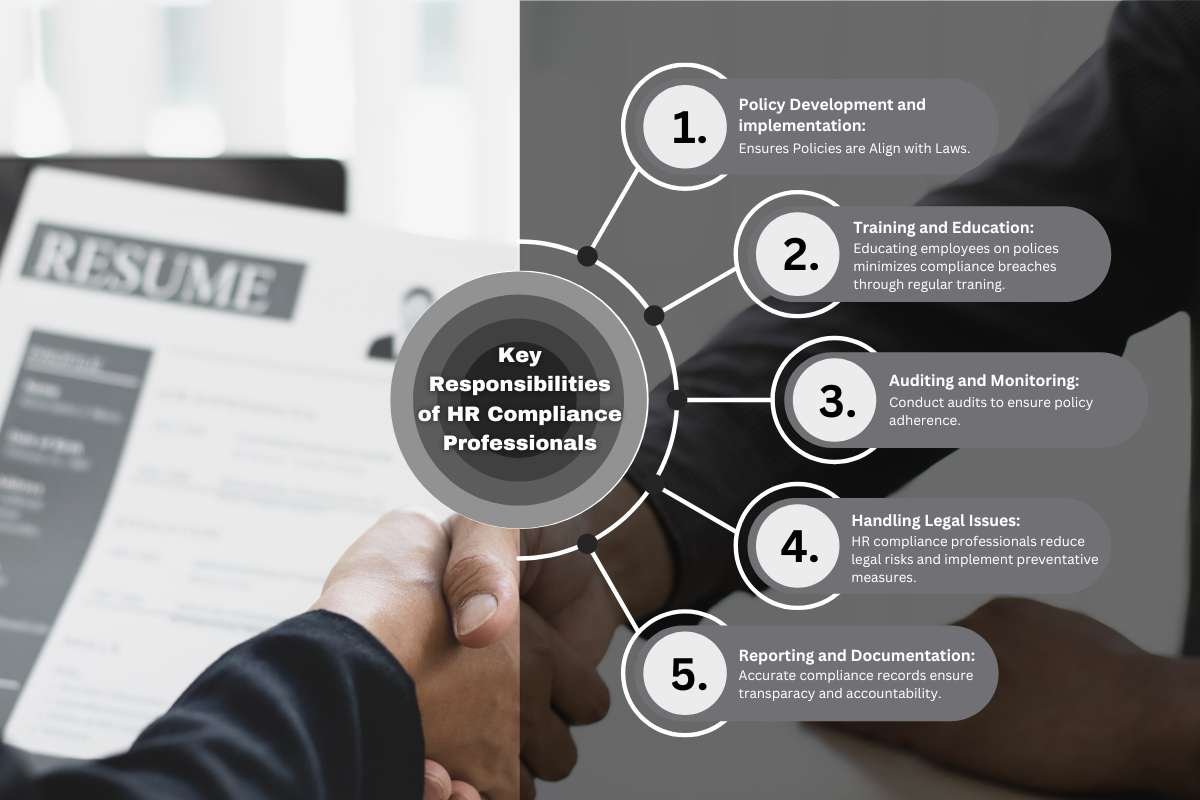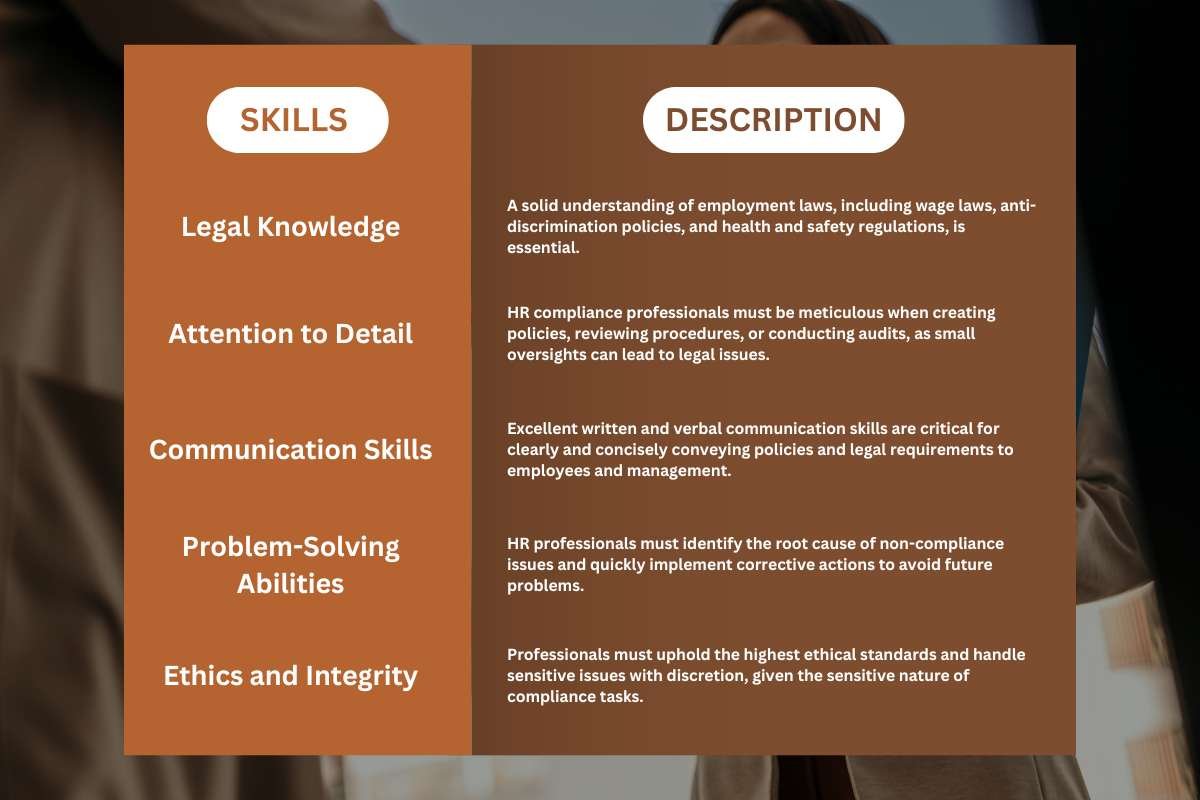Maintaining HR compliance is essential for the legitimacy of your business and the safety of your employees. A specialized Human Resources Compliance team or a designated HR staff member is tasked to adhere to external regulations and internal policies, safeguarding against legal issues and promoting a healthy workplace. But what exactly does an HR compliance job description require? In this article, we will walk you through the key elements of the HR compliance job description, including its definition, responsibilities, necessary skills, and the future of this crucial role.
What is an HR Compliance?
HR compliance remains by the Labor laws, employment standards, and workplace regulations. It ensures that companies operate according to the law while providing an ethical and inclusive environment. An HR compliance role focuses on developing policies aligned with the federal, state, and local levels that agree with anti-discrimination, wage, and safety laws to minimize legal risk. The complexity of global expansion increased it; therefore, HR compliance keeps abreast of changing legislation. These are pretty much the professionals who ensure employees understand the policies of the workplace, and thus they are very important in terms of keeping up a compliant and safe workplace.
Key Responsibilities of HR Compliance Professionals
The HR compliance job description requires a broad range of tasks, all designed to maintain legal and ethical standards within an organization. Key responsibilities include:

1. Essential Skills and Qualifications
It often requires a unique skill set that combines legal knowledge, strong interpersonal abilities, and organizational skills. Some of the essential qualifications include:

| Skills | Description |
| Legal Knowledge | A solid understanding of employment laws, including wage laws, anti-discrimination policies, and health and safety regulations, is essential. |
| Attention to Detail | HR compliance job description professionals must be meticulous when creating policies, reviewing procedures, or conducting audits, as small oversights can lead to legal issues. |
| Communication Skills | Excellent written and verbal communication skills are critical for clearly and concisely conveying policies and legal requirements to employees and management. |
| Problem-Solving Abilities | HR professionals must identify the root cause of non-compliance issues and quickly implement corrective actions to avoid future problems. |
| Ethics and Integrity | Professionals must uphold the highest ethical standards and handle sensitive issues with discretion, given the sensitive nature of compliance tasks. |
Qualifications:
- A bachelor’s degree in HR, business, or a related field is often required, though some positions may also prefer advanced degrees or certifications in HR or compliance.
- Specialized certifications such as SHRM-CP (Society for Human Resource Management – Certified Professional) or CHRC (Certified in Human Resources Compliance) are highly valued in the industry.
2. HR Compliance in Different Industries
The HR compliance job description can vary significantly depending on the industry. For example:
- Healthcare: In healthcare, HR compliance is heavily focused on privacy regulations (like HIPAA in the U.S.), workplace safety, and anti-discrimination laws. Compliance professionals in this sector must ensure that staff adhere to policies designed to protect patient confidentiality and maintain a safe working environment.
- Technology: HR compliance professionals often deal with issues related to intellectual property, data privacy, and global employment laws. The rapid pace of technological innovation means compliance professionals must stay agile and continuously update policies.

- Manufacturing: HR compliance in the manufacturing sector places a strong emphasis on workplace safety regulations, as well as labor standards and wage compliance. In this industry, non-compliance can lead to serious accidents or legal ramifications.
3. Challenges Faced by HR Compliance Officers
While it is a vital function, it comes with its own set of challenges. This role includes managing ever-changing regulations, employee resistance to new policies, and the potential for non-compliance across different departments.
- Constantly Evolving Laws: Labor laws and workplace regulations change frequently, and it’s up to HR compliance professionals to stay informed. Keeping policies up-to-date with these changes requires constant vigilance and flexibility.
- Employee Resistance: When new policies are introduced, some employees may resist or fail to follow them, either due to misunderstanding or reluctance to change. HR compliance professionals must address this by providing clear communication and continuous training.
- Resource Constraints: Smaller companies may struggle to allocate sufficient resources to compliance, leading to potential risks. In these cases, HR compliance professionals need to be resourceful in finding ways to maintain standards on a limited budget.
4. The Future of HR Compliance Roles

As workplace environments continue to evolve, so too will the professionals in this field. Future specialists will need to adapt to trends such as remote work, global hiring, and emerging technologies like AI.
- Remote Work Compliance: With more companies adopting remote and hybrid work models, HR compliance professionals will need to navigate complex Labor laws regarding remote employees, including wage and hour laws, cyber security policies, and health and safety standards for home offices.
- Global Compliance: As businesses expand across borders, HR compliance will become even more complex, requiring professionals to manage international Labor laws, cultural differences, and varying employee expectations.
- Technology Integration: The rise of artificial intelligence and automation in HR tasks will streamline compliance processes but also introduce new challenges, such as data privacy concerns and ethical issues surrounding AI use.
Conclusion
The HR compliance job description is as complex as it is essential. Professionals in this field play a pivotal role in ensuring that organizations comply with ever-changing laws, while also fostering a safe and inclusive workplace. As industries evolve, HR compliance roles will continue to adapt, making this a dynamic and rewarding career path for those with the right skills and qualifications.
Frequently Asked Questions:
What is the role of HR Admin?
HR Admin is responsible for managing personnel records, updating databases, and assisting in HR operations. Handle tasks such as creating company policies, scheduling interviews, and preparing HR-related reports.
Is HR admin a good job?
Working as an HR administrator involves managing various aspects of employee relations, such as recruitment, training, benefits, and payroll.
What is Onboarding in HR?
Onboarding is an HR industry term referring to the process of introducing a newly hired employee into an organization.
What are the five main roles of HR?
Talent Management, Compensation, and benefits, training and development, compliance, and worker safety.
Is HR a high-paying job?
HR professionals can be paid well, especially as they progress into leadership and executive roles. Salaries vary based on experience, industry, and geographic location.









